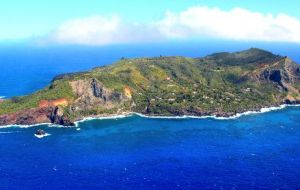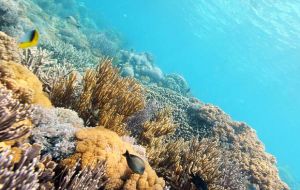MercoPress. South Atlantic News Agency
Conservationists praise UK for creating largest marine reserve around Pitcairn islands
 Chancellor of the Exchequer, Osborne, announced in the Budget that the government intends to proceed with designation of a MPA around Pitcairn”.
Chancellor of the Exchequer, Osborne, announced in the Budget that the government intends to proceed with designation of a MPA around Pitcairn”.  The protected marine reserve, extends from 12 miles offshore Pitcairn Island to the full 200 nautical mile limit, encompassing over 830,000 sq kms of ocean
The protected marine reserve, extends from 12 miles offshore Pitcairn Island to the full 200 nautical mile limit, encompassing over 830,000 sq kms of ocean  Over 1,200 marine species have been recorded around Pitcairn, including whales and dolphins, 365 species of fish, turtles, seabirds and corals.
Over 1,200 marine species have been recorded around Pitcairn, including whales and dolphins, 365 species of fish, turtles, seabirds and corals. Leading conservation groups, scientists and residents of Pitcairn Island congratulated the UK Government on its decision to create the world’s largest marine reserve around the Pitcairn Islands, a UK Overseas Territory in the South Pacific.
The Chancellor of the Exchequer, George Osborne, announced in the Budget that “The government intends to proceed with designation of a MPA around Pitcairn”.
This decision begins the process of creating a fully protected marine reserve, extending from 12 miles offshore of Pitcairn Island to the full 200 nautical mile limit of the Territory’s waters, encompassing over 830,000 square kilometers of ocean, an area about 3.5 times the size of the UK.
The coalition, led by the Royal Society for the Protection of Birds, The Pew Charitable Trusts, the Zoological Society of London, the Blue Marine Foundation, the Marine Conservation Society, Greenpeace UK and the National Geographic Society praised the creation of the Pitcairn marine reserve as a monumental step for ocean conservation.
When taking all 14 of its Overseas Territories into account, the UK is responsible for the fifth largest area of ocean in the world, measuring 6.8 million square kilometers, over twice the size of India, and nearly 30 times the size of the UK itself. Some 94% of the UK’s biodiversity exists in these Territories.
The announcement of the designation of a Pitcairn marine reserve means that the UK now has the two largest marine reserves in the world, the second largest being the Chagos marine reserve created around the British Indian Ocean Territory in 2010. This puts Britain virtually level-pegging with the USA, who top the table for the most marine area fully protected following the expansion of the Pacific Remote Islands Marine National Monument by President Obama last year.
Pitcairn’s waters host some of the best-preserved marine ecosystems on the planet and are of globally significant biological value. Over 1,200 marine species have been recorded around Pitcairn, including whales and dolphins, 365 species of fish, turtles, seabirds and corals. Forty-eight of these species are globally threatened – such as the critically endangered hawksbill turtle, and some are found nowhere else on Earth – such as the Pitcairn angelfish.
With the designation of the marine reserve, Pitcairn’s waters will become off-limits to all extractive and damaging activities, offering protection from overfishing and illegal pirate fishing, as well as deep-sea mining exploration, pollution and climate change.
Conservationists and the Island’s residents have been campaigning for the creation of a reserve around Pitcairn since 2013. In February 2015 a coalition of over 100 conservation and environmental organizations and scientists launched the www.GreatBritishOceans.org campaign, to encourage the Government to create fully protected marine reserves in the UK Overseas Territories, principally around the Pitcairn Islands, Ascension Island in the Atlantic and the South Sandwich Islands in the Southern Ocean.
Excepting Pitcairn's announcement, only around 3% of the world’s ocean has any protection at all, and less than 1% is classified as ‘fully protected’. This is despite commitments from 194 countries to protect 10% of the entire global ocean by 2020. The designation of the Pitcairn marine reserve means that the UK Government is now fully protecting nearly a quarter (22%) of waters under British jurisdiction, and has increased the global fully protected area by a quarter.




Top Comments
Disclaimer & comment rules-

-

-

Read all commentsGood news but how will it be policed . Pitcairn has no natural harbour or airstrip that could station any sort of fisheries protection vessel. Satellite surveillance ?.
Mar 19th, 2015 - 09:32 am 0Another British naval base nearby,
Mar 19th, 2015 - 11:12 am 0I presume their is an island able to accommodate,
as you say, its a very big area to police.
@1. No doubt British forces will create something. Didn't create the Mulberry harbours for 1944? Heavy-lift helicopters?
Mar 19th, 2015 - 11:38 am 0Commenting for this story is now closed.
If you have a Facebook account, become a fan and comment on our Facebook Page!